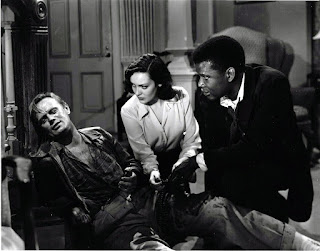Dr. Luther Brooks (Sidney Poitier) is the first black doctor at a respectable hospital. His mentor Dr. Dan Wharton (Stephen McNally) assigns Luther to the prison ward, where the racist criminal Ray Biddle (Richard Widmark) and his brother Johnny are admitted with gunshot wounds.
Johnny dies while Luther is trying to save his life, but Ray insists his brother was murdered by the doctor and refuses to authorize an autopsy that would prove the cause of death. Luther and Wharton turn to Johnny's ex-wife Edie (Linda Darnell) for help, but she is manipulated by Ray, who wants to spark racial riots between adjacent white and black neighbourhoods.
Sidney Poitier's first major screen role is a powerful, sometimes painful, commentary on poisonous white supremacy. Ray Biddle is a despicable character who makes no attempt to hide his blind hatred of blacks, and in the hands of director Joseph L. Mankiewicz, No Way Out becomes a searing examination of what Dr. Brooks is forced to endure. Despite the robust support of his mentor Dr. Wharton, Luther is surrounded by eyes loaded with suspicion, doubt, or outright contempt.
While always impactful, No Way Out suffers from some needless meandering. The script (by Mankiewicz and Lesse Samuels) goes searching for a larger story about inter-neighbourhood strife in an attempt to expand from the personal to the collective. Scenes of goons from adjacent communities prodded into street battles are impressively staged, but stray away from the compelling central characters and individual conflicts.Better are the representations of Dr. Brooks' home life, and the emphasis on his family's normality. In portraying a black family striving towards the common American dream, Mankiewicz succeeds in isolating Ray Biddle as the outlier somehow expressing contempt for the nation's most admired traits.
Caught in the middle is the character of Edie Johnson, representing internal turmoil between a tainted past and a potentially better future. She intuitively knows she must distance herself from the toxicity of former brother-in-law (and illicit lover) Ray, but is still susceptible to his fake charms and false narratives. Poitier, Richard Widmark, and Linda Darnell add plenty of streetwise grit in the three central roles, investing in deeply uncomfortable and emotionally draining scenes.
Ray and Johnny Biddle have a third brother, the deaf and mute George. He is observant, conniving, and an eager enabler of prejudice, virulent bigotry thriving in the shadow of silence.
All Ace Black Movie Blog reviews are here.



No comments:
Post a Comment
We welcome reader comments about this post.